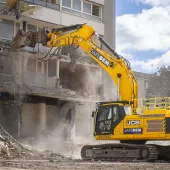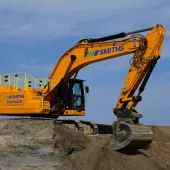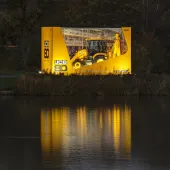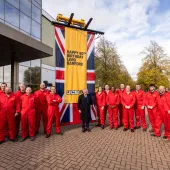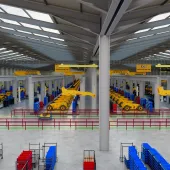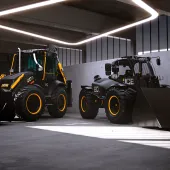Tier 4 Final engines for JCB's heavier crawler excavators

MTU engine set to boost fuel efficiency, productivity and performance of JS300, JS330 and JS370 machines
JCB are boosting the fuel efficiency, productivity and performance of their heavier crawler excavators with the installation of Tier 4 Final diesel engines. The six-cylinder MTU 6R1000 engine – already proven in JCB’s largest wheel loader, the 457 – will now be used in the JS300, JS330 and JS370 machines.
The 7.7-litre MTU diesel engine is a highly efficient turbocharged and intercooled powerplant that will deliver 180kW (241hp) in the JS300 and 210kW (281hp) in the JS330 and JS370 models. The machines will incorporate selective catalytic reduction (SCR) within the exhaust system, with dosing of a urea-based diesel exhaust fluid (DEF) to reduce NOx emissions by almost 90%.
This system allows the MTU engine to meet Tier 4 Final without having to use a diesel particulate filter (DPF), thereby reducing cost and service complexity for the customer. Their introduction means fuel savings for customers of up to 10% on the JS370 and 5% on the JS300 and JS330.
The excavators are equipped with a 47-litre DEF tank and the fluid is used at a rate of around 3% compared with fuel consumption. This means that operators will only need to top up the DEF tank, which is located within the top toolbox, with every third tank of diesel.
A warning system incorporated within the JS excavators’ main monitor will provide operators with graduated warnings of reducing DEF levels to prevent automatic downrating if the DEF tank is not replenished.
By upgrading to the MTU engine, JCB say they have been able to reduce the number of fuel filters required from three to two, thus reducing operating costs for customers. A fuel shut-off tap has also been fitted to make service work easier.
The air cleaner has also been upgraded, with the JS machines moving to a new power core unit. This air cleaner uses an ultra-web nano-fibre technology that delivers increased dust-holding capability. The unit is said to be three times more efficient than a pleated filter, yet offers increased airflow. Moreover, it is stronger and more durable and, with the option of a scavenger pre-cleaner, there is no requirement for a vacuator valve.
Access to the new engine has also been improved, with the adoption of a single-piece canopy. The steps have been redesigned with an extended lower step as part of a two-tier toolbox. The bottom tier provides access to the standard refuelling pump, while the upper section contains the DEF/AdBlue filler.
Tread plates have been installed on the steps and the upper structure, and the machines now benefit from a standard riser handrail, side handrail and kickplates for added safety. Optional full-surround ‘boxing ring’ handrails are available if preferred.
JCB’s Side Impact Protection System (SIPS), which is standard on the company’s heavy-duty XD demolition specification machines, can now be ordered as an option on all models. This integral box-section design provides an additional barrier to protect all core components of the machine. A wide range of additional options is available for the larger JS models, including ‘seatbelt in use’ green beacons.
Customers can also specify a Plus Pack for the three excavators. This includes a deluxe operator seat, a radio, footrests and T-bar tracking levers in the cab. Externally the Plus Pack incorporates a black revolving frame, a rain guard, six LED worklights, the scavenger pre-cleaner and Plus decals on the door.



